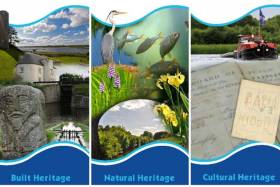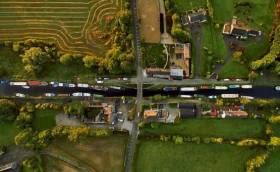Displaying items by tag: Heritage Plan
Waterways Ireland Heritage Plan Open Day Next Week
#InlandWaters - Waterways Ireland is hosting its second annual Heritage Plan Open Day from noon to 7pm next Wednesday 13 December at its headquarters in Enniskillen, Co Fermanagh.
Visitors can review all the actions of the Heritage Plan that were progressed in 2017, as well as meet staff from the various divisions within Waterways Ireland to chat face-to-face about potential projects, ideas and support the cross-border body can offer stakeholders in Ireland’s inland waterways.
Come and listen to oral histories, inspect archival material and discuss waterway place names. Sit down and review the wide variety of natural, built and cultural heritage reports commissioned throughout the year.
View the work undertaken by the recipients of the 2017 Heritage Grants Scheme. Staff will be on hand to advise on the 2018 Grants Scheme, too.
Talk to Waterways Ireland about potential projects you’d like progressed in 2018, partnerships you can offer or general queries about the Heritage Plan.
Waterways Ireland’s chief executive Dawn Livingstone will also be present on the day, with eight dedicated slots for one-to-one meetings available to reserve via Doodle.
Have your say in the ‘What Floats your Boat’ public feedback corner where you can leave a comment on what you like or where you think Waterways Ireland could improve our service to our stakeholders.
There will also be free boat trips (spaces allocated on a first come, first served basis) from the Waterways Ireland HQ moorings from 1-3pm.
Take one of two one-hour boat tours of Enniskillen and Devenish Island, or try your hand at a Menapii currach with Row the Erne, winners of the Living Waterways National Award (weather dependant).
Limited parking is available at the Waterways Ireland HQ, which is also accessible on foot from the town centre.
Waterways Ireland Wins Heritage Award At World Canals Conference
#InlandWaters - Waterways Ireland has won the Guardian Award at the 2016 World Canals Conference for its Traditional Heritage Boat Survey of the Royal Canal, Grand Canal, Barrow Line Canal and Barrow Navigation.
Undertaken as part of the Waterways Ireland Heritage Plan launched earlier this year, the project was led by environment officer Cormac McCarthy, who attended the event in Scotland to receive the presentation.
The World Canals Conference took place Monday 19 to Thursday 22 September in Inverness, welcoming international waterway experts, business leaders and global professionals to join in celebrating and exploring innovation in sustainable tourism, regeneration, engineering and heritage management of our waterways and much more.
The Guardian Award is sponsored by Historic Environment Scotland and celebrates outstanding work to safeguard the heritage of the world's waterways.
In other inland waterways news, Two Cooks Restaurant & Wine Bar in Sallins, Co Kildare, on the banks of the Grand Canal, took the Taste of the Waterways Award for 2017 at the Georgina Campbell Awards.
The winning eatery – opened recently by Josef Zammit and Nicola Curran, a well known couple with a following among Kildare diners – is one of many featured in A Taste of the Waterways, the annual guide produced by Waterways Ireland in conjunction with Georgina Campbell.
Other waterfront winners at the latest ceremony include Viewmount House in Longford, along the Royal Canal, which was named Country House of the Year, and Country Choice in Neagh, Co Tipperary, a popular rest stop on for Shannon boaters, which won the award For Services to Irish Food & Hospitality.






























































